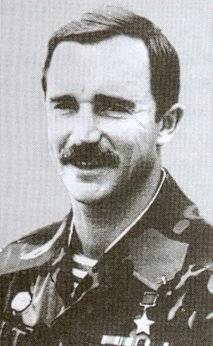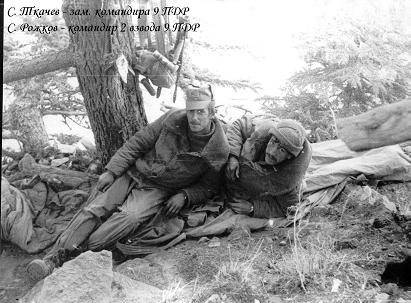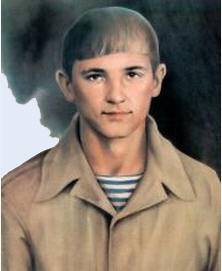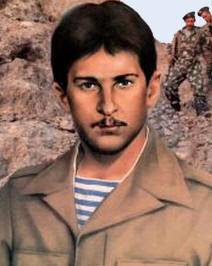Feat of the ninth company
Paktiya Province is located in eastern Afghanistan, on the very border with Pakistan, and is inhabited mainly by Pashtun tribes, akin to the population of the neighboring Pakistani province. Its geographical position was very beneficial for the Mujahideen, as reinforcements could penetrate through the almost transparent Afghan-Pakistani border, including even units of regular Pakistani troops. In the city of Khost, also located on the border with Pakistan, Afghan Mujahideen planned to launch the activities of their own government, which they saw as the center of anti-Soviet and anti-communist resistance in the country. In fact, the Mujahideen, with the support of the Pakistani special services, planned to “tear off” Khost district from the rest of the province and turn it into a support base for the further deployment of hostilities.
The host has been under siege for many years. The situation became especially complicated after the Soviet troops withdrew and only parts of the DRA government troops remained in the city. Afghan mojaheds blocked all ground approaches to the city, although there remained the possibility of transporting reinforcements, food, and ammunition by air. The road to the Host has not been used for eight years, since 1979. Naturally, this seriously hampered the control of government troops over the district and over the state border of Afghanistan. The Soviet command had long been planning to organize an operation to unblock the city.
In the end, in 1987, this operation under the name "Highway" was developed. Her goals were to unlock and clear the Host in order to take full control of its surroundings. Significant forces of both OKSVA and Afghan government troops were allocated for the operation. The main striking force of the offensive was to become the units of the 103rd Airborne Division, 108th and 201st Motor Rifle Divisions, 56th Separate Air Assault Brigade, 345th Separate Airborne Regiment, 45th Engineer and Sapper 191st Motor Rifle Regiments. The Afghan government dispatched units of five infantry divisions and tank brigades, as well as 10 battalions of Tsarandoy. The operation began on November 23, 1987, after the Soviet and Afghan command were convinced of the impossibility of holding talks with the radical commander Jalaluddin Hakani, who commanded Mujahideen forces in the Khosta area.
The operation was carried out fairly quickly, after which the road to Khost was under the control of Soviet and government troops. December 30 The 1987 of the year was restored to the car service with Khost. However, since the situation still remained unstable, it was decided to put a guard on the road, which could ensure the safety of traffic. The south side of the road was assigned to defend the 3-th parachute battalion of the 345-th separate parachute regiment.
 The 345 th separate parachute regiment is one of the most famous in the Soviet airborne troops. In Afghanistan, he was from the very beginning of hostilities. The same ninth company of the regiment, which will be discussed below, was directly involved in the storming of the Amin palace 27 in December 1979. Then the 9-th company was commanded by Senior Lieutenant Valery Vostrotin (later - a prominent Soviet and Russian military leader, who served as Colonel-General Guard and held nine years, from 1994 to 2003, the position of Deputy Minister of the Russian Federation for Civil Defense, Emergencies and Elimination consequences of natural disasters). Thus, by the time of the events described, the regiment had been in Afghanistan for eight years. By the way, he commanded them in 1986-1989. Valery Vostrotin.
The 345 th separate parachute regiment is one of the most famous in the Soviet airborne troops. In Afghanistan, he was from the very beginning of hostilities. The same ninth company of the regiment, which will be discussed below, was directly involved in the storming of the Amin palace 27 in December 1979. Then the 9-th company was commanded by Senior Lieutenant Valery Vostrotin (later - a prominent Soviet and Russian military leader, who served as Colonel-General Guard and held nine years, from 1994 to 2003, the position of Deputy Minister of the Russian Federation for Civil Defense, Emergencies and Elimination consequences of natural disasters). Thus, by the time of the events described, the regiment had been in Afghanistan for eight years. By the way, he commanded them in 1986-1989. Valery Vostrotin. To defend the height of 3234, which is located on 7-8 kilometers south-west of the middle section of the Gardez-Khost road, the 9-I parachute company of the 345-th regiment was allocated. Only 40% of the personnel of the company were sent to the altitude - 39 people, they were appointed to command the deputy commander of the 9 paratrooper company of senior lieutenant Sergey Tkachev, who served as company commander at the time (company commander Alim Mahotlov was on vacation at that time - in Soviet Union). The altitude was reinforced by arranging firing positions and shelters for personnel, a minefield was established on the south side. To reinforce the company, they identified the calculation of a large-caliber machine gun, and also included an artillery spotter — senior lieutenant Ivan Babenko, who served as a platoon commander for the 2 howitzer artillery battery of the artillery battalion of the 345 regiment.
In total, 5 officers and 1 ensign were in position. They were Guards Senior Lieutenant Sergey Tkkachev - Deputy Commander of the 9-th Parachute Company, Acting Commander, Guards Senior Lieutenant Vitaly Matruk - Deputy Commander of the 9 Company for Political Affairs, Guards Senior Lieutenant Viktor Gagarin, Commander of the 1 th Company for the political part, Guards Senior Lieutenant Viktor Gagarin, commanding the 2-th platoon Guards Senior Lieutenant Sergey Rozhkov, who commanded the 9 platoon, Guards Senior Lieutenant Ivan Babenko, a spotter, and Guard Ensign Vasiliy Kozlov, foreman of the XNUMX th parachute company.

7 January 1988, a detachment of Afghan Mujahideen attacked the height of 3234. The Mujahideen planned to eliminate guard guard at the commanding altitude, which would allow them to open access to the Gardez-Khost road and get the opportunity for its unimpeded shelling. Mujahideen prepared quite well for an attack on the height - they pulled up recoilless guns, mortars, and used rocket launchers. Thanks to the hidden trails, the mojaheds managed to get close to the positions of the 9 company on 200 meters. Shelling from recoilless guns and mortars began in 15: 30 minutes, and in 16: 30, the Mujahideen launched an attack under the cover of artillery fire. The Mujahideen attacked in two directions and to no avail. 50 minutes later attacks killed 10-15 militants and 30 were injured. Radio operator Fedotov was killed during the shelling, after which the company lost its radio. Senior Lieutenant Viktor Gagarin, who commanded the 3 th platoon of the 9 th company, could so effectively organize the defense of their positions that the attack of the Mujahideen choked.
In 17: 30, the second attack of the Mujahideen began - this time from another direction, to the positions that the platoon under command of Senior Lieutenant Rozhkov defended. Around 19: 00 mujahideen attacked again. This time, the Mujahideen combined shelling and attack positions. Moreover, as the participants of those events recall, this time the Mujahideen rose to the attack in full growth, apparently counting on the psychological effect.
 The attack was really terrible. Gunners senior sergeants Borisov and Kuznetsov died. The junior sergeant Vyacheslav Alexandrov (in the photo), who commanded the detachment, gave his command to retreat, and he himself fired until the last, until he was covered with a grenade launcher.
The attack was really terrible. Gunners senior sergeants Borisov and Kuznetsov died. The junior sergeant Vyacheslav Alexandrov (in the photo), who commanded the detachment, gave his command to retreat, and he himself fired until the last, until he was covered with a grenade launcher. Senior Lieutenant Babenko requested the support of artillery. Three D-30 howitzers and three Acacia self-propelled guns were beating the Mujahideen's positions. A total of 600 shots were fired, and at some points the artillery guns beat very close to the positions of the company.
The fourth attack followed in 23: 10. In total up to three o'clock in the morning twelve attacks were undertaken. By this time, the position of the 9 Company had deteriorated so much that the officers were ready to fire artillery. However, they got through to help - the reconnaissance platoon of the 3 of the paratroop battalion under the command of Senior Lieutenant Alexei Smirnov, who delivered the ammunition and allowed him to go to the counterattack. Although Smirnov came to the aid of only fifteen scouts, this turned out to be sufficient for a radical change in the situation.
As a result of the arrival of reinforcements, the Mujahideen were forced to stop the attack of the Soviet positions and withdrew, gathering the wounded and killed. Thus, as a result of a twelve-hour battle, the Mujahideen did not manage to crush the resistance of Soviet soldiers. The heroic fighters of the 9-th company were able to defend their heights in battle with superior enemy forces. The losses of the Soviet soldiers amounted to 6 people killed and 28 people injured. The posthumously junior sergeant Vyacheslav Alexandrov and private Andrei Melnikov (in the photo) were awarded the high title of Heroes of the Soviet Union.
 At the time of the death of a junior sergeant Aleksandrov, a native of Orenburg, was only 20 years old, and a native Melnikov, a native of Mogilev, was only 19 years old (he had already married a little daughter before he was called up for military service). Andrei Kuznetsov, who served as a sergeant in the 9 th company and took part in the heroic defense of the height 3234, in an interview with RIA News then he said that in addition to 6 who died in the battle itself, another fifteen people subsequently died from injuries or their consequences in hospitals. 8 man left capable. What is most interesting is that they all remained at the same height of 3234, reinforced by a reconnaissance platoon.
At the time of the death of a junior sergeant Aleksandrov, a native of Orenburg, was only 20 years old, and a native Melnikov, a native of Mogilev, was only 19 years old (he had already married a little daughter before he was called up for military service). Andrei Kuznetsov, who served as a sergeant in the 9 th company and took part in the heroic defense of the height 3234, in an interview with RIA News then he said that in addition to 6 who died in the battle itself, another fifteen people subsequently died from injuries or their consequences in hospitals. 8 man left capable. What is most interesting is that they all remained at the same height of 3234, reinforced by a reconnaissance platoon. By the way, the Mujahideen did not abandon attempts to eliminate the positions of the Soviet troops at the height of 3234 in the future. The reconnaissance platoon of senior lieutenant Smirnov, who remained at the height, more than once was subjected to mortar attacks from dushmans.
In addition to the militants Khakani, the most direct part in the assault on the height of 3234 took the so-called. "Black storks". Still story This sabotage detachment, fighting as part of the forces of the Afghan Mujahideen, remains very poorly understood. According to the most common version, the backbone of the "black storks" were the Pakistani special forces. Unlike the Mujahideen from among the Pashtun peasants, the Pakistani special forces had a much higher level of training - they were trained by cadre officers of the Pakistani army and by American military advisers. Another version says that in addition to Pakistani special forces, the “black storks” also accepted the most trained volunteers from among both the Afghan mujahideen and foreigners from Saudi Arabia, Jordan, Egypt, China (Xinjiang Uygur Autonomous Region of China). Gulbuddin Hekmatyar tried to create a real elite from the “black storks”. Each fighter of this unit had to possess the skills of not just a shooter and a scout, but also a sniper, a radio operator and a miner. According to the memoirs of the participants of the Afghan war, the “black storks” were distinguished not only by good preparation, but also by incredible cruelty, taking part not only in combat operations, but also in the torture of captured Soviet soldiers and soldiers of the Afghan government forces.
In any case, Pakistan and its special services were directly related to the organization of the attack on the height of 3234. However, the Soviet Union continued to maintain diplomatic relations with the state, in fact openly opposing the Soviet Army during the Afghan war. Pakistani security forces trained Afghan mojaheds, placed training camps and bases in the border provinces of Pakistan, organized a stream of foreign mercenaries and volunteers, and in the end they simply sent Pakistani special forces to participate in individual operations. And all this got away from Islamabad, in the same way as the brutal suppression of the uprising of Soviet prisoners of war in the camp of Badaber.
Even now, thirty years after the events, the feat of the 9-th company of the 345-th regiment cannot be forgotten. Once again, the Soviet soldiers, most of whom were very young 19-20-year-old boys, showed the world the wonders of courage and heroism. Unfortunately, the prowess of Soviet soldiers and officers who fought in faraway Afghanistan did not find a worthy reward at home. Three and a half years after the battle at 3234, the Soviet Union collapsed. His advocates, very young guys, remained without proper help and attention from the state, survived as best they could. Personnel officers continued to serve, and the demobilized conscripts and military personnel who had gone to the reserve, it was not very easy. How many internationalist warriors could not adapt to civilian life and perished after the war, in peaceful Russian cities and villages. Nevertheless, one hundred percent you can be sure that even if the soldiers and officers of the 9 company knew what they were waiting for both the Soviet country and themselves, they would still do the same as they did - they would to end.
Information